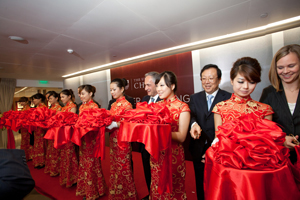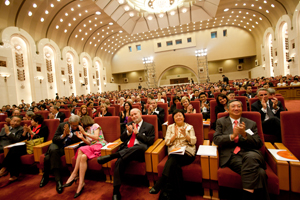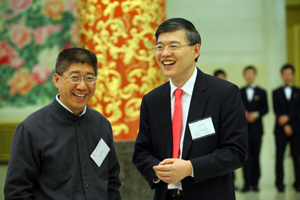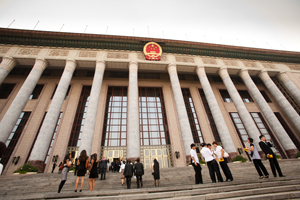Base in Beijing
The University's new Center in Beijing guarantees established Chicago–China partnerships will continue to flourish.
By Laura Demanski, AM’94
Photography by James Wasserman
"Does anybody know who has the gong?" At Beijing's Shangri-La hotel, a University staffer was on the hunt a few minutes before a panel discussion began. The sounding of the gong would signal guests to take their seats in the ballroom, where Chicago professors Dipesh Chakrabarty, W. J. T. Mitchell, and Judith Farquhar, AM'75, AM'79, PhD'86, and Tsinghua University professor Wang Hui would discuss culture in a globalizing era. The scholarly panel was one of five that, along with a gala dinner and a ribbon-cutting ceremony, marked the official opening of the University of Chicago Center in Beijing.

With golden scissors, officials cut the ribbon to open the Center. View the slideshow and take a virtual tour.
Quickly located, the gong provided a gentle but needed reminder for a group of UChicagoans who had a lot of catching up to do. Between scheduled events, the nearly 600 alumni, friends, faculty, deans, and students at the September 14–15 celebration swapped business cards, snapped photographs, and squeezed conversations into every bit of available down time.
Heading to the stage for Tuesday evening’s Nobel-laureate panel discussion, economics professor James Heckman bolted up the aisle to bear-hug a Chinese colleague. At Wednesday afternoon’s ribbon cutting, guests gravitated to a white, floor-to-ceiling relief map of Hyde Park, pointing out the spots they used to call home, or still do. “I think everyone expected to be walking into a very formal event, but it just had such a good, community feeling,” says Beth Bader, MBA’90, the center’s executive director.
Taking up the 20th floor of an office building in northwest Beijing’s university district, the center is loaded with reminders of home. “We wanted it to scream Chicago,” says Nicholas Nichols, the University facilities-services project manager who oversaw its design and construction. Form follows function: establishing such a center, its supporters say, elevates everything the University does in Asia and creates possibilities for more ambitious research and new scholarly partnerships. Joining the University’s Center in Paris and Chicago Booth School of Business campuses in London and Singapore, the Center in Beijing may serve as a model for other international facilities as the University looks to expand its global presence.
The Beijing center hosts conferences where scholars from Chicago, Asia, and beyond share their research. September saw five such events, touching on physics, business, economics, medicine, and art. It also serves as a home base, staffed and connected to the University’s information-technology network, from which faculty and graduate students can pursue research in Asia. Undergraduate students in the College’s East Asian Civilizations and soon-to-be-launched Social Sciences in Beijing programs attend some classes there. And local alumni and volunteers will use the space for alumni-club gatherings.
Although the white paint is still pristine and the (local, sustainable) bamboo furniture unnicked, the origins of the Center in Beijing reach back decades. They can be traced to the 1930s, when the University’s first program in Far Eastern studies was founded, and to the 1940s, when physicists C. N. Yang, PhD’48, and T. D. Lee, PhD’50, were earning their doctorates. In 1957 they became the first Chinese nationals to receive the Nobel Prize. In the 1980s organismal biology and anatomy professor Paul Sereno dug for dinosaurs side by side with Chinese paleontologists in the fossil-rich countryside. And in 2006 College students began traveling to Beijing to study in the Civilization Abroad program there. The rich history of China–Chicago connections made September’s events in the capital feel not like a maiden voyage but like the next leg of a continuing journey, in a top-of-the-line ship.

In the Great Hall of the People, the audience applauds the Nobel panel.
On Wednesday, at the first of four panel discussions, a trio of local university presidents joined President Robert J. Zimmer to exchange views about the role of higher education in their countries. They focused on challenges specific to China (for example, the relative youth of its universities) and the United States (Zimmer cited the “current anti-immigration climate” and diminishing support for “high-quality higher education as a public good”). All agreed that universities everywhere must better educate global citizens and that a project like the center enables more students to gain direct experience of other countries. But “we must work hard together another 50 to 100 years,” said President Zhou Qifeng of Peking University, to reach this ambition.
The subsequent panels brought together Chicago and China faculty in the core areas of the center’s focus: business, economics, and policy; culture, society, and the arts; and science, medicine, and public health. By midafternoon more than 20 scholars had spoken, and a new fleet of shuttle buses carried guests a short way to the center for the ribbon cutting.
The place was packed when Zimmer welcomed Lien Chan, AM’61, PhD’65, the honorary chairman of Taiwan’s Kuomintang Party and trustee emeritus of the University. Lien studied political science at the University, was married in Bond Chapel, and received the Alumni Medal in 1991. The opening was “an especially poignant moment,” he said, because he was now playing host to the University: “There’s a change in roles here.” Wielding nine pairs of golden scissors, Lien, Zimmer, and seven faculty, alumni, and trustees cut the silken red ribbon at eight minutes past the hour. With that, the center was officially open.
For Chicago faculty who study China, establishing a center there is a natural—and long-desired—step. Before China’s economic boom and the increased openness of Chinese society over the past two decades, a permanent facility wasn’t in the cards. Those developments not only made such a center more imaginable, they made it indispensable, according to history professor Guy Alitto, AM’66, one of the first Americans invited to visit Communist China, in 1973. “The importance of the center now is enormous,” he says. “China is rising, or you could say returning, to its place of prominence in all spheres.”

Faculty director Dali Yang (right) with Yan Jun of Peking University's International Office.
Anthropologist Judith Farquhar agrees. In a sense, she says, the University has always been in China through its faculty and students forging relationships there. But a physical presence in today’s China is crucial, and not only for scholars who study the country.
“The University has had many long-standing, important links with Beijing and with China in general,” she says. “What we have not been as good at—and this is true of most U.S. universities—is involving people who are not in China studies. Except for Chicago Booth, we haven’t had many significant collaborations with China that don’t have to do with understanding China better”—such as her research on traditional Chinese medicine or Alitto’s work on the country’s intellectual and cultural history. “For connecting the whole breadth of the great research communities of these two countries, a center like this is going to make a big difference.”
China scholars will benefit more immediately. This March Farquhar, the Max Palevsky professor of anthropology and of social sciences in the College, launched an ambitious project that will rely on the Center in Beijing. She and Lili Lai, a postdoc at Peking University, set up field sites in southwestern and western China to study traditional medicine used by minority nationalities. This summer they trained a team of ten local researchers to interview healers and gather medical literature in these communities.
Farquhar and Lai’s work is proceeding in parallel with a study the Chinese government has undertaken to discover, develop, and organize traditional therapeutic treatments. Pharmaceutical companies also have an interest in finding these treatments and “rendering them scientific,” Farquhar says, with an eye to future patents. Aware of this possibility, the government may be acting to preserve such indigenous knowledge as part of the nation’s cultural heritage. She and Lai are working closely with government officials in Beijing as well as local research centers near the field sites. They hope to better understand the government’s objectives and also to answer their own questions about the construction of knowledge—how local, folk knowledge becomes scientific knowledge, for example.
Because Farquhar and Lai must coordinate a large team of investigators, Farquhar says, “the center is a perfect place from which to work.” It’s hard to imagine running their project from borrowed space in China, much less from another continent.
Farquhar, who helped found found the College’s Civilization Abroad program in China and is coteaching it this autumn, also anticipates how the center will serve students. But she doesn’t want them to spend too much time there: “It should make all practical things so easy for them that they will then have the time and energy to get out into the city, far beyond the academic community.” It’s at sites such as the Forbidden City and the Temple of Heaven, and at performances of traditional Chinese music, she says, that “I’ve seen American students have amazing moments here in Beijing.”
On the Tuesday of the opening, second-year College student David Wang, an economics and history major, was having one such moment. The scheduled events were just hours away, and Wang had shown up at the Grand Hyatt Beijing to help Chicago staff prepare. His day had started out well and promised to get better: In the morning he received his letter of acceptance to the social-sciences sequence that the College will debut in Beijing this coming spring on the politics and economics of China, led by the center’s faculty director, political-science professor Dali Yang. Wang’s task later that afternoon was to assist the Chicago Nobel laureates participating in the opening panel discussion at the Great Hall of the People: physicist James Cronin, SM’53, PhD’55, and economists Gary Becker, AM’53, PhD’55; James Heckman; and Roger Myerson (C. N. Yang had planned to participate but couldn’t attend). “I’m very excited,” Wang said. “My job is to show them where they need to be and to mingle with them.”

The Great Hall.
Wang was one of several undergraduates at the opening. Some students enrolled in the autumn Civilization Abroad program had traveled to China early to work on their language skills or to explore the city. Others, like Wang, happened to be in the area and volunteered to help. They stuffed programs, made name tags, and distributed tickets. Logistical duties completed, they attended the events in an ambassadorial spirit, telling alumni about the University today.
Civilization Abroad classes, which began September 27, meet in the center’s lecture and seminar rooms. Students also use the lounge, café, and study rooms. They live in dormitories at Renmin University, whose campus is a stone’s throw away, and partner with Renmin students for Mandarin-language tutoring. Plans for this fall include faculty-led field trips to the Beijing History Museum, the City Planning Museum, and a traditional-medicine clinic.
For graduate students, the space provides computers and coffee and, more importantly, the scholarly community they might miss from campus lounges and cafés. The Friday after the opening, anthropology student Saul Thomas, AB’95, AM’02, this quarter’s teaching assistant for Civilization Abroad, was camped in a study room with his laptop and books. While getting ready for the 19 College students arriving over the next two weeks, he was also chipping away at his dissertation—on Chinese intellectuals’ responses to social changes following the Cultural Revolution.
Thomas first became captivated by Chinese history in a Core curriculum course with former history and East Asian languages and civilizations professor Prasenjit Duara, who now directs humanities and social-sciences research at the National University of Singapore. Thomas conducted most of his on-site dissertation research in 2006–07, before the center opened. Working there now, he’s impressed. It’s well situated for a student, he says, being next to a major university, near other top universities, and right on a subway line. “Every time students come here,” Thomas says, “they’re able to cultivate and expand their contacts with Chinese academics, which is extremely important. And the center is a beautiful place. I love it here. If I had a choice, I might not go back.”
In fact, Thomas will return to Chicago in December to finish his dissertation. After graduation he’ll still have access to the center; alumni have a standing invitation to stop by, have coffee or tea, and see what’s going on, says Bader. During the next year, she and her staff will develop more formal opportunities for them to use the center and meet faculty and students working there.
The president of Beijing’s alumni club, Paul Wang, LLM’94, JSD’99, hopes that will mean more talks by Chicago faculty, which the club’s 100-plus members relish. They meet most weeks for lectures, drinks, day trips, and even overnight excursions. Having a patch of Chicago in their midst is a thrill. “The University in China was already a tradition,” he says, “and now, with the center, it has great momentum.”
It was a longtime University faculty member—Cass Sunstein, now a visiting law professor—who first drew Wang into that tradition. In 1988 Wang took a summer course in administrative law at Peking University with the visiting Sunstein. When he arrived at the Law School a few years later, Sunstein became his academic adviser. They keep in touch, although since Sunstein went to work in Washington, Wang says, it’s harder to make lunch dates.
Like Wang, almost every formal speaker at the opening had a story of beginnings. “I was invited here in 1981 to teach how markets operate,” Becker said at Tuesday’s panel; “now the Chinese can teach us.” Mitchell spoke of his first visit in 1988 to teach English Romantic poetry to 20 Chinese students, who wanted to hear about the poems’ formal properties instead of the lessons he’d prepared on their historical and political context. Wang Hui remembered marveling at the Seminary Co-op Bookstore on his first visit to Chicago in 1993 and how it expanded his book-buying habits.
Decades of past encounters like these laid the path to the Center in Beijing, with its views that stretch beyond the city limits. Now that its doors are open, the future of Chicago in China has a broad horizon as well.
Sound bites: Outtakes from the panel discussions
“At Chicago when I was a student, Fermi, Teller, Maria Goeppert-Mayer, Chandrasekhar were all there. My fellow students were intensely passionate about physics. It was a red-hot environment for the development of answers in particle physics. ... Chicago now is comparable to the 1950s. We will solve the problem of missing matter or dark matter.”—Physics Nobelist James Cronin

Chicago economist James Heckman (above); World Bank chief economist Justin Yifu Lin, PhD’86.
“How much is the American public willing to support high-quality higher education as a public good? ... In China this support is natural; all see education as a value and a necessity. The regeneration of public support in the U.S. is a fundamental problem. ... The U.S. [also] has been a magnet for people of talent for generations. It’s crucial to continue welcoming immigrants energetically.”—University President Robert J. Zimmer
“Economic progress induces greater personal freedom. That’s an old idea. I think it’s been manifested in China. The difference between the degree of personal freedom when I visited in 1981 and today is like night and day. It’s enormous. Not only because of the Internet—people are freer to speak up. I think that’s very closely related to economic development.”—Economics Nobelist Gary Becker
“When dinosaurs were alive, there were no national borders. Paleontologists must always work beyond borders. ... China is a rich fossil resource. Without remarkable fossils, it’s hard to do remarkable research.”—Chang Mee-man, research professor, Institute of Vertebrate Paleontology and Paleoanthropology, Chinese Academy of Sciences
“I’m constitutionally drawn to problems that can never be solved—thus I left business, my first career. I was too impractical. [I wanted to work at] the woolly, unsolvable conundrums of human existence that attend every moment of our lives.”—Dipesh Chakrabarty, professor of history and South Asian languages and civilizations
“The most useful thing I learned at Chicago for understanding China was in a book by Alfred Marshall. Marshall studied industries and made detailed on-site visits, taking notes, with his wife acting as research assistant. It’s very difficult to understand China. You must make on-site visits to see it and smell it like Marshall. This is the importance of the Center in Beijing.”—Wong Yue-Chim Richard, AB’74, AM’74, PhD’81, economics department chair, University of Hong Kong
“In 2004 Tsinghua University invited Critical Inquiry to talk about the future of criticism in the humanities. We were sponges learning about the way the Chinese thought about culture and theory. I hope today is another one of those grand moments.”—W. J. T. Mitchell, Gaylord Donnelley distinguished service professor of English and art history
“I personally accompanied President Zimmer on his first trip to China, which was to Shanghai, where I’m from. He said then that he wanted to do this differently than other universities in China, and he has.”—Francis T. F. Yuen, AB’75, University trustee
“In opening this center, the University did not want to affiliate with any single Chinese university. This is our first foray in China and will be the first of many. … Let’s go develop the Chicago–China team that will transform global health.”—Funmi Olopade, human geneticist and associate dean for global health
WRITE THE EDITOR
DISCUSS THIS ARTICLE
E-MAIL THIS ARTICLE
SHARE THIS ARTICLE
MORE FROM THE MAGAZINE
WEB EXTRA
RELATED LINK
RELATED READING
- "Eastward Bound" (University of Chicago Magazine, Jan–Feb/10)
- "Professor Dali Yang Appointed Faculty Director of Center in Beijing" (University of Chicago News Office, February 23, 2010)
- "University of Chicago to Open New Center in Beijing, Building on Legacy of Collaboration" (University of Chicago News Office, April 26, 2010)
- "Center in Beijing Opens with Focus on Collaboration" (University of Chicago News Office, September 13, 2010)
- "Open for Business" (UChiBLOGo, September 15, 2010)
phone: 773/702-2163 | fax: 773/702-8836 | uchicago-magazine@uchicago.edu
